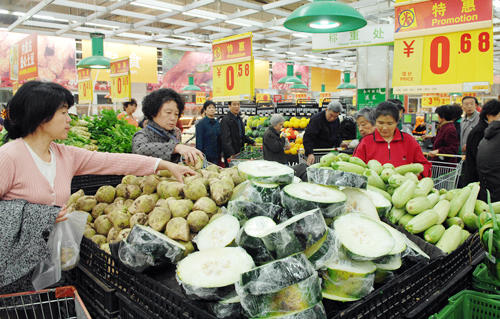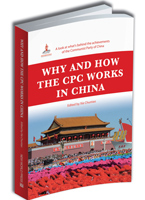|
 |
|
BOOMING MARKET: Shoppers buy vegetables in a supermarket in Tianjin on October 31 (ZHANG CHAOQUN) |
Beijing Review continues to publish edited excerpts of Why and How the CPC Works in China. Edited chapter seven—How Could the CPC Integrate Socialism With the Market Economy—is as follows:

During her visit to China in 1991, former British Prime Minister Margaret Thatcher told President Jiang Zemin that socialism was incompatible with a market economy. She also said that capitalism and privatization were preconditions for a market economy. Her view was representative of the opinion in the capitalist world, but was not accepted by Jiang. One year later, Jiang proclaimed at the 14th National Congress of the CPC in 1992 that the goal of China's economic restructuring was to establish a socialist market economic system. It is astonishing to many people that China's socialist market economy is so vibrant and has produced important achievements. Many people may wonder how the CPC could integrate socialism with a market economy.
Economists have argued over the relationship between the planned and market economies for over a century. The Soviet Union was the first country where a planned economy model was formed. Shortly after the CPC came to power, China established a planned economy, copying the Soviet Union by prioritizing heavy industry in the development strategy.
With the incessantly expanding scale of economic construction and continuous increase in the quantity of products and the demands of the people, the drawbacks of China's planned economic system gradually became more and more obvious. As a result of the rigid planned economic system, the efficiency of socioeconomic development was quite low, and people found it increasingly hard to make ends meet. Everything was in short supply. The phenomenon was called a shortage economy by Janos Kornai, a Hungarian economist. Of 1 billion Chinese people, 250 million lived under the poverty line in 1978.
The actual situation in China and the difficulties of the Soviet Union sent a strong signal to the CPC—it would not do any longer to walk on the path of the planned economy.
The only way out was to reform. Late Chinese leader Deng Xiaoping proposed starting the reform by expanding the rights of enterprises to make their own decisions. Economists also became active. To cope with the defects in the planned economy, which restricted the role of the market, they urged that it was necessary to observe the law of value and give the role of the market full play in economic construction.
The large number of unemployed young people in cities began seeking their own means of livelihood, plunging into the market with government permission. Privately run businesses sprang up and developed rapidly. China also made headway in implementing its opening-up policy. Practice showed that the economy developed much faster in areas where the role of the market was given full play, but slowly elsewhere. Under such circumstances the CPC was determined to promote economic restructuring. The traditional idea of contrasting a planned economy with a commodity economy was abandoned on October 20, 1984. Three years later it was proposed at the 13th National Congress of the CPC that China's economy was a planned commodity economy on the basis of public ownership; and the economic operation pattern was defined as "the state guides the market, and the market guides enterprises," which for the first time clarified that the roles of planning and the market could be combined in society at large.
Opinion was divided on whether market-oriented reforms should continue in China after the Soviet Union and the socialist countries in Eastern Europe all collapsed. Whatever people intended to do, it was imperative to ask first whether it was "capitalist" or "socialist." As a result, people were afraid and unable to initiate anything. China's reform process slowed down. In 1990 economic development slumped.
At this critical moment, on December 24, 1990, during a talk with other leaders, Deng pointed out: "We must understand that the difference between capitalism and socialism is not a market economy as opposed to a planned economy. If we did not have a market economy, we would have no access to information from other countries and would have to reconcile ourselves to lagging behind."
Deng played the role of "Mr. Key" in exploring the development of the market economy with Chinese characteristics. "The reform and the opening-up policy have been successful not because we relied on books, but because we relied on practice and sought truth from facts. Many of the good ideas in rural reform came from people at the grassroots. We studied them, and raised them to the level of guidelines for the whole country," Deng said.
| 